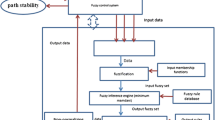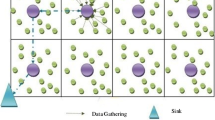Abstract
Motivated by the growing environmental concerned (effect of greenhouse gases) coupled with increasing cost of energy, green computing emerges as promising solution to energy-limited IoT network. As IoT network consists of limited low-battery power smart sensors having ability to connect over wireless network for transmission of data, energy harvested from the environment by the sensor node reduces carbon emission and also recharges its battery continuously, and this harvested energy is used by sensors for its working operation that enhances the lifetime of the IoT network. In this paper, a Fuzzy Q-reinforcement learning (FQRL) scheme using fuzzy logic and model-free Q-learning to optimize the energy consumption in perpetual operations of IoT nodes is presented. The optimization of energy consumption is subject to adaptive duty cycle exercised to smart sensors. The learning agent of FQRL updates If-Then rules of fuzzy controllers according to reward received by learning agent through interacting with environment. The learning agent rewards for good action (increasing the firing strength of rule) and punishes (decrease the firing strength of rule) for bad action subject to maintain the energy neutrality condition. Finally, simulation results show the proposed FQRL outperforms in terms of duty cycle and residual energy after perpetual operation. It means presented algorithm FQRL provides smart sensors to achieve better charging status of their battery and suitable for energy harvested IoT networks.
Access this chapter
Tax calculation will be finalised at checkout
Purchases are for personal use only
Similar content being viewed by others
References
Kumar, S., Kaiwartya, O., Rathee, M., Kumar, N., Lloret, J.: Toward energy-oriented optimization for green communication in sensor enabled IoT environments. IEEE Syst. J. (2020)
Kumar, S., Kumar, V., Kaiwartya, O., Dohare, U., Kumar, N., Lloret, J.: Towards Green Communication in Wireless Sensor Network: GA Enabled Distributed Zone Approach. Ad Hoc Netw. 93, 101903 (2019)
Premsankar, G., Di Francesco, M., Taleb, T.: Edge computing for the internet of things: a case study. IEEE Internet Things J. 5(2), 1275–1284 (April 2018)
Khatri, A., Kumar, S., Kaiwartya, O., Aslam, N., Meena, N., Abdullah, A.H.: Towards green computing in wireless sensor networks: controlled mobility–aided balanced tree approach. Int. J. Commun. Syst. (2018)
Kashyap, P.K., Kumar, S., Jaiswal, A.: Deep learning based offloading scheme for IoT networks towards green computing. In: IEEE International Conference on Industrial Internet (ICII), Orlando, USA, pp. 22–27 (2019)
Gupta, S.K.S., et al.: Research directions in energy-sustainable cyber physical systems. Sustain. Comput. Inform. Syst. 1, 57–74 (2011)
Choi, K.W., et al.: Simultaneous wireless information and power transfer (SWIPT) for internet of things: novel receiver design and experimental validation. IEEE Internet Things J. 7(4), 2996–3012 (April 2020)
Margolies, R., Gorlatova, M., Sarik, J., Stanje, G. et al.: Energy harvesting active networked tags (EnHANTs): prototyping and experimentation. ACM Trans. Sens. Networks 11(4), 62:1–62:27 (November 2015)
Kansal, A., Hsu, J., Zahedi, S., Srivastava, M.B.: Power management in energy harvesting sensor networks. ACM Trans. Embed. Comput. Syst. 6(4), article 32 (2007)
Kashyap, P.K., Kumar, S., Dohare, U., Kumar, V., Kharel, R.: Green computing in sensors-enabled internet of things: neuro fuzzy logic-based load balancing. MDPI Electronics 8(4), 384–405 (2019)
Kumar, K., Kumar, S., Kaiwartya, O., Kashyap, P., Lloret, J., Song, H.: Drone assisted flying ad-hoc networks: mobility and service oriented modeling using neuro-fuzzy. Ad Hoc Netw. 106, 102242 (2020)
Wanigasekara, C., Swain, A., Almakhles, D., Zhou, L.: Design of dynamic fuzzy Q-learning controller for networked wind energy conversion systems. In: IEEE International Conference on Environment and Electrical Engineering (EEEIC/I&CPS Europe), pp. 1–6, Madrid, Spain (2020)
Panahi, F.H., Panahi, F.H., Hattab, G., Ohtsuki, T., Cabric, D.: Green heterogeneous networks via an intelligent sleep/wake-up mechanism and D2D communications. IEEE Trans. Green Commun. Networking 2(4), 915–931 (Dec. 2018)
Zhou, L., Swain, A., Ukil, A.: Q-learning and dynamic fuzzy Q-learning based intelligent controllers for wind energy conversion systems. In: 2018 IEEE Innovative Smart Grid Technologies—Asia (ISGT Asia), Singapore, pp. 103–108 (2018)
Mendil, M., De Domenico, A., Heiries, V., Caire, R., Hadjsaid, N.: Battery-aware optimization of green small cells: sizing and energy management. IEEE Trans. Green Commun. Networking 2(3), 635–651 (Sept. 2018)
Alsharif, M.H., et al.: Green wireless network optimisation strategies within smart grid environments for Long Term Evolution cellular networks in Malaysia. Renew. Energy 85, 157–170 (2016)
Khalilpour, R., Vassallo, A.: Planning and operation scheduling of pv-battery systems: A novel methodology. Renew. Sustain. Energy Rev. 53, 194–208 (2016)
Michelusi, N., et al.: Energy management policies for harvesting-based wireless sensor devices with battery degradation. IEEE Trans. Commun. 61(12), 4934–4947 (2013)
Leithon, J. et al: Renewable energy management in cellular networks: an online strategy based on ARIMA forecasting and a Markov chain model. In: Wireless Commun. Net. Conference, IEEE (2016)
Wei, Z., Zhao, B., Su, J., Lu, X.: Dynamic edge computation offloading for internet of things with energy harvesting: a learning method. IEEE IoT J. 6(3), 4436–4447 (June 2019)
MPR2400CA http://www.memsic.com/userfiles/files/Datasheets/WSN/micaz_datasheet-t.pdf
OS08A10. http://www.ovt.com/sensors/OS08A10
Available on: https://ww2.energy.ca.gov/almanac/renewables_data/solar/index_cms.php
Author information
Authors and Affiliations
Corresponding author
Editor information
Editors and Affiliations
Rights and permissions
Copyright information
© 2021 The Author(s), under exclusive license to Springer Nature Singapore Pte Ltd.
About this paper
Cite this paper
Kumar, M., Kashyap, P.K., Kumar, S. (2021). Fuzzy Q-Reinforcement Learning-Based Energy Optimization in IoT Network. In: Udgata, S.K., Sethi, S., Srirama, S.N. (eds) Intelligent Systems. Lecture Notes in Networks and Systems, vol 185. Springer, Singapore. https://doi.org/10.1007/978-981-33-6081-5_13
Download citation
DOI: https://doi.org/10.1007/978-981-33-6081-5_13
Published:
Publisher Name: Springer, Singapore
Print ISBN: 978-981-33-6080-8
Online ISBN: 978-981-33-6081-5
eBook Packages: Intelligent Technologies and RoboticsIntelligent Technologies and Robotics (R0)




